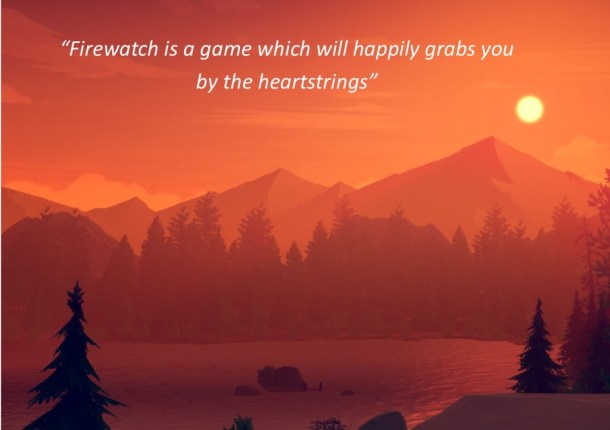Firewatch – Review
PC, PS4
I’m only a young-ish guy. I was born in 1989 (making me a spritely 27 year old by the time you’re reading this), the year in which Firewatch was set. I’ve also never been to the United States, let alone the Wyoming Forests, charged with manning a station to look out for fires or lost visitors. Despite all these factors, things that should serve as barriers to immersion, Firewatch combines expert story-telling, a stunningly realised world, gorgeous visuals and fantastic character development, in a way that makes me feel like I’ve somehow lived this all before. Firewatch is a game which will happily grabs you by the heartstrings, ragdolls your emotions about for 3-4 hours and leaves you gasping for air upon its conclusion.
It’s certainly hard to talk about Firewatch without diving headlong into spoilers, so I’ll keep them as minimal as possible. The game kicks off with a prologue that introduces you to Henry, a down on his luck, blue collar worker who is weary after years of looking after his wife who had been diagnosed with Alzheimer’s. After his wife returns with her parents to Australia, Henry is left alone, and with little else left before him, he chooses to takes on a job as fire lookout in the Wyoming Shoshone National Forest. He’s hardly on the job long before he hears from Delilah, his supervisor who begins to talk him through the ropes. As the game plays out both Henry and Delilah find themselves stumbling into a mystery that grows and evolves as the summer season plays out.
The only way the pair can communicate is via wireless radio, but it is the dependency upon one another for comfort and support that makes Firewatch engaging throughout. I found myself feeling incredibly tense as the mystery begun to reach its climax, but in the softer moments I was gripped to the growing relationship between Henry and Delilah. I did find it a shame that there were several multi-week jumps in time, and this meant that some opportunities to witness their relationship blossom were unfortunately ripped from our grasps. Despite the game’s name, you won’t actually be doing much fire watching, and though they do emerge in the back end of the game, they serve only as decoration amongst a stunning backdrop for the games events. After a 3-4 hour journey, it is likely that the finale will divide the opinions of players. This is due to the fact that despite there being a lot of player agency, and choices that can be made, the final outcome has already been determined for you. I personally got an ending that I felt was befitting of the Henry that my choices that crafted, but this may not necessarily be the case for all who play the game.
Back to the topic of the backdrop though, the world of Firewatch is absolutely stunning. The western sunsets bask you in a dazzling glow, the world is gorgeous with mountains in the distance drawn in pastel, and the world around you bathes you in colour. Firewatch is a sight to behold, but this attention to detail extends into the realm of audio as well. You’ll spend a lot of time hiking throughout the forest, and it feels just like you’re there thanks to the sound of crunching grass under your shoes, the chirping of birds and other fauna in the area, right down to the crackle that emits from your radio. You’ll spend the entirety of your time in Firewatch alone so when Delilah’s voice begins to burst from your radio, you’ll be relieved that she sounds so believable. I’ve already spoken to the strength of the pairs budding relationship, but when both of them are as sensationally voice-acted as they have been you can’t help but feel immersed that much more.
All this sounds pretty fantastic, but it’s not all smooth sailing for Firewatch. The game’s greatest weakness is in its gameplay, where it seems that the developers at Campo Santo have wrestled with (and lost) the battle of realism versus functionality. Thanks to thousands of years of human existence we know that one cannot competently read a map and run through a national forest at the same time. The developers, as they attempted to simulate realism, made a few niggling mistakes that while aren’t horrific, are cumbersome and break the immersion a bit. The radio for example requires you to hold down the L2 trigger then with the same hand use the D-Pad to select your dialogue option, before releasing, all this before a timer counts down and your silence becomes the determined response – it’s a lot to juggle. The game does suffer from a few performance issues on the PS4 version with pop-in and frame-rate dips both present, but despite being infrequent, it does ruin the flow a bit, and becomes a little jarring given that everything else looks so good.
Firewatch has a deeply riveting narrative, all ground out from the simplest of premises. It places you on a rollercoaster ride that makes you feel emptiness, anxiety, tension, joy and hope in any moment, toying with your heart throughout. I recommend consumption across a single 3-4 hour sitting, but regardless, Firewatch is the sort of game that we need more of, not fewer, and it leaves me excited to see what Campo Santo does next. It is not without its share of gameplay flaws and technical hiccups, but Firewatch truly is an experience that engages and impresses on a variety of levels. This could be a game we’re looking back at quite fondly in a few years.
Paul James













